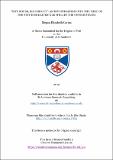Files in this item
'Tiny house, big impact?' : an investigation into the 'rise' of the Tiny Home Lifestyle (THL) in the United States
Item metadata
| dc.contributor.advisor | Reid, Louise Anne | |
| dc.contributor.advisor | McKee, Kim | |
| dc.contributor.advisor | Ellsworth-Krebs, Katherine | |
| dc.contributor.author | Carras, Megan | |
| dc.coverage.spatial | 233 p. | en_US |
| dc.date.accessioned | 2019-06-05T14:18:34Z | |
| dc.date.available | 2019-06-05T14:18:34Z | |
| dc.date.issued | 2019-06-26 | |
| dc.identifier.uri | https://hdl.handle.net/10023/17821 | |
| dc.description.abstract | The burst of the housing bubble in the United States ignited political and economic shockwaves, bringing global financial markets to the brink of collapse and kick-starting the Great Recession. This devastating crisis was the result of irresponsible housing practices and policy interventions rooted in the contemporary neoliberal mentality of rule that encouraged homeownership and failed to regulate high-risk lending (Aalbers, 2015). The Tiny Home Lifestyle (THL) has gained popularity amidst this contemporary era of housing instability, and offers a small, more affordable, and often aesthetically appealing version of a traditional American home. Despite growing awareness around the THL, it has been neglected as the subject of rigorous academic study. Therefore, the primary aim of this thesis was to explore and explain the Tiny Home Lifestyle (THL) in the United States. This alternative, small-living housing option was positioned amidst the traditional housing market, debt encumbrance, and contemporary consumer culture, relying on the American dream ethos as a lens to explore aspirations of homeownership. The conceptual basis for the interrogation of the THL was rooted in the Foucauldian (1988) notion of ‘technologies of the self’. This was applied to investigate the promotion of a self-governing individual in pursuit of being a responsible and ethical citizen. The methodological approach of this research was reliant on the recent turn in governmentalities studies that employ non-archival methods to explore the nuances of governing practices and actualities of subject identity formation. One key finding of this thesis was that almost all participants expressed financial freedom as the primary motivation for adoption. Arguably, these dwellers have been governed into taking responsibility over their housing and understanding the provisions of the THL as ‘more free’ than what is provided by traditional housing, rather than the result of a constraining neoliberal mentality of rule. However, data suggested that dwellers were active in this process and appropriated normalisation and differentiation tactics to responsibilise and moralise their decision to adopt this lifestyle and become ‘tiny housers’. This thesis demonstrates how an unaffordable housing market ignited new housing ‘choices’ and how dwellers shifted identities in this process, potentially altering housing trajectories in the future. This contributes to post-recession understandings of housing amidst the contemporary neoliberal regime. | en_US |
| dc.language.iso | en | en_US |
| dc.publisher | University of St Andrews | en |
| dc.rights | Attribution-NoDerivatives 4.0 International | * |
| dc.rights.uri | http://creativecommons.org/licenses/by-nd/4.0/ | * |
| dc.subject | Tiny house | en_US |
| dc.subject | Governmentality | en_US |
| dc.subject | Sustainable housing | en_US |
| dc.subject | Affordable housing | en_US |
| dc.subject | Foucault | en_US |
| dc.subject | Great Recession | en_US |
| dc.subject | Tiny homes | en_US |
| dc.subject | Consumption | en_US |
| dc.subject.lcc | NA7533.C28 | |
| dc.subject.lcsh | Small houses--United States | en |
| dc.subject.lcsh | Sustainable living--United States | en |
| dc.subject.lcsh | Housing--United States | en |
| dc.title | 'Tiny house, big impact?' : an investigation into the 'rise' of the Tiny Home Lifestyle (THL) in the United States | en_US |
| dc.type | Thesis | en_US |
| dc.type.qualificationlevel | Doctoral | en_US |
| dc.type.qualificationname | PhD Doctor of Philosophy | en_US |
| dc.publisher.institution | The University of St Andrews | en_US |
| dc.identifier.doi | https://doi.org/10.17630/10023-17821 |
The following licence files are associated with this item:
This item appears in the following Collection(s)
Except where otherwise noted within the work, this item's licence for re-use is described as Attribution-NoDerivatives 4.0 International
Items in the St Andrews Research Repository are protected by copyright, with all rights reserved, unless otherwise indicated.


